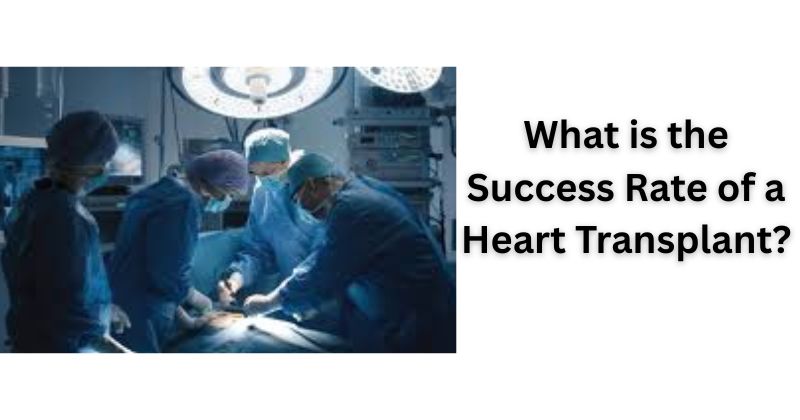A heart transplant surgery offers a second chance at life for individuals suffering from severe heart failure or other debilitating heart conditions. The procedure involves replacing a damaged or diseased heart with a healthy one from a donor. While the surgery is complex and involves significant risk, advancements in medical technology, surgical techniques, and post-operative care have led to increased success rates in recent years. This article will explore the success rate of heart transplant surgery, the factors that affect outcomes, and the heart transplant surgery cost considerations.
Success Rate of Heart Transplant Surgery
The success rate of heart transplant surgery has improved dramatically over the past few decades. Today, the overall success rate of the procedure is high, and many patients live for years after their surgery with a good quality of life. However, the success rate can vary based on several factors, including the patient’s age, underlying health conditions, and the quality of the donor heart.
1. Short-Term Success Rates
In the short term, heart transplant surgery has an impressive success rate. According to data from the American Heart Association, approximately 85% to 90% of patients who undergo heart transplant surgery survive for at least one year after the procedure. This is a significant improvement from previous decades when survival rates were lower due to limited medical advancements and understanding of organ rejection.
The first year after surgery is crucial because this is when the risk of complications, such as rejection or infection, is highest. With proper post-operative care, including medications to suppress the immune system and prevent rejection, most patients go on to live much longer than the initial recovery period.
2. Five-Year Success Rates
Looking at the five-year survival rates, the statistics remain promising. Around 70% to 75% of heart transplant recipients are alive five years after their surgery. These outcomes depend on various factors, including the patient’s ability to adhere to their post-transplant care regimen, manage medications, and maintain overall health.
The five-year mark is often used as a key benchmark for assessing the long-term success of a heart transplant. Many patients who reach this milestone go on to live for much longer, enjoying a high quality of life with minimal heart complications. However, organ rejection, infection, and other medical issues can still present challenges during this period, which is why ongoing monitoring and care are critical.
3. Ten-Year Success Rates
Although heart transplant recipients generally experience good outcomes, the survival rate does decline as time progresses. According to the International Society for Heart and Lung Transplantation, around 50% of heart transplant recipients survive for ten years or more. Survival rates after ten years can be influenced by factors such as the development of graft coronary disease (a condition that affects the transplanted heart’s blood vessels) and the long-term effects of immunosuppressive medications.
Graft coronary disease is a common cause of death in long-term heart transplant recipients. It’s a type of coronary artery disease that can affect transplanted hearts, and patients need to follow regular check-ups to monitor for its early signs.
Factors Affecting the Success Rate of Heart Transplant Surgery
While heart transplant surgery has a generally high success rate, various factors can influence individual outcomes. Understanding these factors helps patients and healthcare providers tailor the treatment and post-operative care plans to improve survival and quality of life.
1. Age of the Patient
Age plays a significant role in the success rate of heart transplant surgery. Generally, younger patients tend to have better outcomes, as they are more likely to recover from surgery and tolerate the lifelong medications and lifestyle changes necessary post-transplant. However, older patients can still benefit from a heart transplant, though they may face a slightly higher risk of complications or organ rejection.
2. Overall Health of the Patient
A patient’s overall health is another critical factor in determining the success of a heart transplant. Patients who are otherwise healthy, with no significant chronic conditions such as diabetes, kidney disease, or obesity, tend to have better outcomes. Those who are already dealing with multiple health issues may experience more complications during and after surgery.
3. Quality of the Donor Heart
The success of a heart transplant surgery is closely tied to the quality of the donor heart. A heart from a healthy donor who is a close match to the recipient has a much better chance of being successfully transplanted. Matching blood types, tissue compatibility, and the donor’s age and medical history all affect the outcome. Organs that are harvested from donors with a history of smoking, drug use, or certain infections may not perform as well after transplantation.
4. Post-Surgery Care and Medications
Post-operative care is crucial in determining the success of a heart transplant. The immune system needs to be suppressed with medications to prevent rejection of the new heart, but this also increases the risk of infections. Managing these medications carefully is key to ensuring the body doesn’t attack the new organ while still maintaining a level of immune defense. Strict adherence to follow-up appointments, regular testing, and monitoring of heart function are vital to long-term success.
5. Psychosocial Factors
The mental and emotional health of heart transplant recipients also plays a role in the success of the surgery. Patients who are emotionally supported and mentally prepared for the challenges that come with a heart transplant are more likely to have better outcomes. Psychological factors such as depression or anxiety can affect a patient’s ability to care for themselves after the surgery, leading to complications or poor health management.
Risks and Complications After Heart Transplant Surgery
While the success rates for heart transplant surgery are promising, there are risks involved. Some of the most common complications include:
- Rejection: The immune system may attack the new heart, leading to rejection. This is a significant risk in the first year after surgery and is managed through immunosuppressive therapy.
- Infections: Because of the need for immunosuppressive drugs, transplant patients are at increased risk of infections, which can be severe or even life-threatening.
- Graft Coronary Disease: This is a form of coronary artery disease that affects transplanted hearts. It can develop over time and reduce the heart’s function.
- Kidney and Liver Damage: Long-term use of immunosuppressive drugs can lead to kidney or liver damage, requiring careful monitoring.
Heart Transplant Surgery Cost
One of the most significant concerns for patients considering a heart transplant is the heart transplant surgery cost. The cost of a heart transplant can vary widely depending on various factors, including the hospital, the geographical location, and the patient’s medical insurance coverage.
In the United States, the total cost of heart transplant surgery can range from $700,000 to $1.2 million. This includes the surgery itself, hospitalization, post-operative care, and medications. Long-term costs such as immunosuppressive medications can add tens of thousands of dollars annually. Patients should discuss these costs with their healthcare providers and insurance companies to ensure proper financial planning.
Insurance often covers the bulk of the surgery costs, but out-of-pocket expenses may still be significant. Patients should be prepared for the financial aspect of the transplant process and explore resources and assistance programs that may help offset the costs.
Conclusion
The success rate of heart transplant surgery is impressive, with high survival rates in the short term and encouraging outcomes for many patients in the long term. Advances in medical technology and improved surgical techniques have significantly increased the chances of a successful transplant. However, factors such as age, overall health, the quality of the donor heart, and post-surgery care all play a significant role in determining individual outcomes.
While the heart transplant surgery cost can be substantial, the potential for improved health and quality of life makes it a life-changing procedure for many. With careful planning, adherence to medical advice, and ongoing monitoring, heart transplant recipients can enjoy many years of good health after surgery.
for more(click here)






Leave A Comment